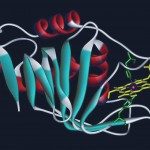Link to Pubmed [PMID] – 17229885
Mol. Biol. Cell 2007 Apr;18(4):1233-41
Entry into mitosis is a highly regulated process, promoted by the activated Cyclin B1/Cdk1 complex. Activation of this complex is controlled, in part, by the protein kinase Aurora-A, which is a member of a multigenic serine/threonine kinase family. In normal cells, Aurora-A activity is regulated, at least in part, by degradation through the APC-ubiquitin-proteasome pathway. It has recently been proposed that, in Xenopus, Aurora-A degradation can be inhibited by phosphorylation. It would thus be expected that a phosphatase activity would release this blockade at the end of mitosis. Here, we have shown that the protein phosphatase PP2A and Aurora-A are colocalized at the cell poles during mitosis in human cells and interact within the same complex. Using the PP2A inhibitor okadaic acid and an RNAi approach, we have shown that this interaction is functional within the cell. PP2A/Aurora-A interaction is promoted by an S51D mutation in Aurora-A and inhibited by a phosphomimetic peptide centered around Aurora-A S51, thereby strongly suggesting that PP2A controls Aurora-A degradation by dephosphorylating serine 51 in the A box of the human enzyme.
